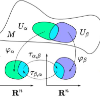A nonequilibrium system is characterized by a set of thermodynamic forces and fluxes which give rise to entropy production (EP). We show that these forces and fluxes have an information-geometric structure, which allows us to decompose EP into contributions from different types of forces in general (linear and nonlinear) discrete systems. We focus on the excess and housekeeping decomposition, which separates contributions from conservative and nonconservative forces. Unlike the Hatano-Sasa decomposition, our housekeeping/excess terms are always well-defined, including in systems with odd variables and nonlinear systems without steady states. Our decomposition leads to far-from-equilibrium thermodynamic uncertainty relations and speed limits. As an illustration, we derive a thermodynamic bound on the time necessary for one cycle in a chemical oscillator.
翻译:无平衡系统具有一系列热动力和通量的特点,这些热动力和通量产生酶生产(EP)。我们表明,这些力量和通量具有信息地理结构,使我们能够将EP分解成一般不同类型(线性和非线性)离散系统的贡献。我们侧重于超量和内存分解,这种分解将保守和非保守力量的贡献区分开来。不同于波多野-萨萨分解,我们的家用/过量术语总是定义清晰,包括在有奇异变量和非线性系统但无稳定状态的系统中。我们的分解导致远离等离子体的热动力不确定关系和速度限制。举例来说,我们从化学振动器中一个循环所需的时间上获得热力。



